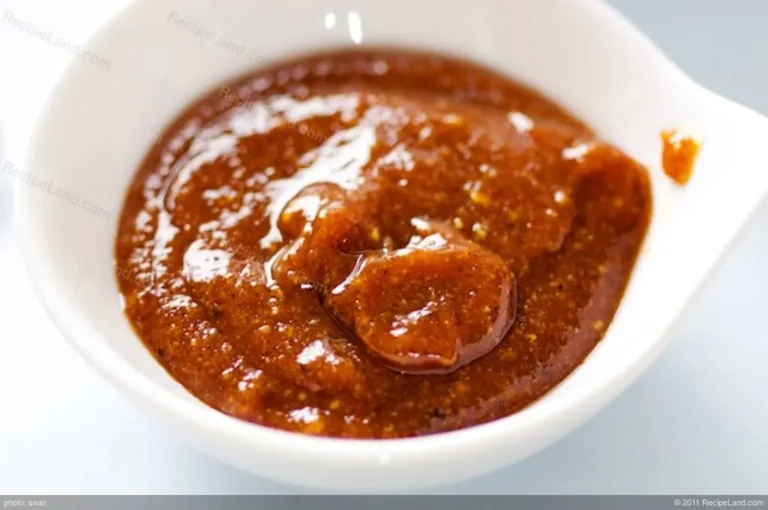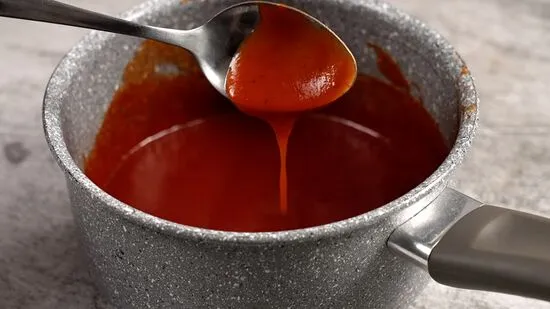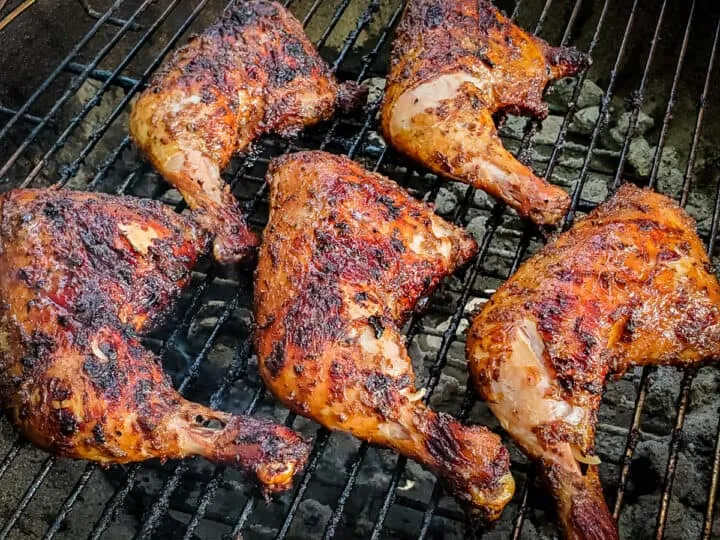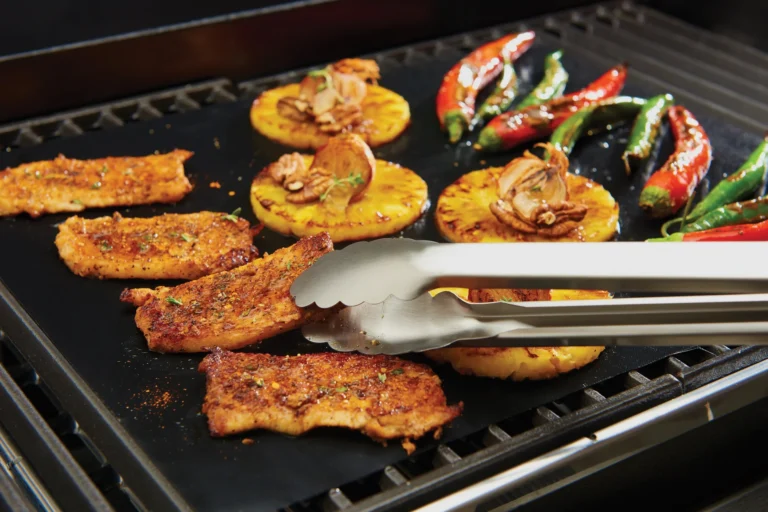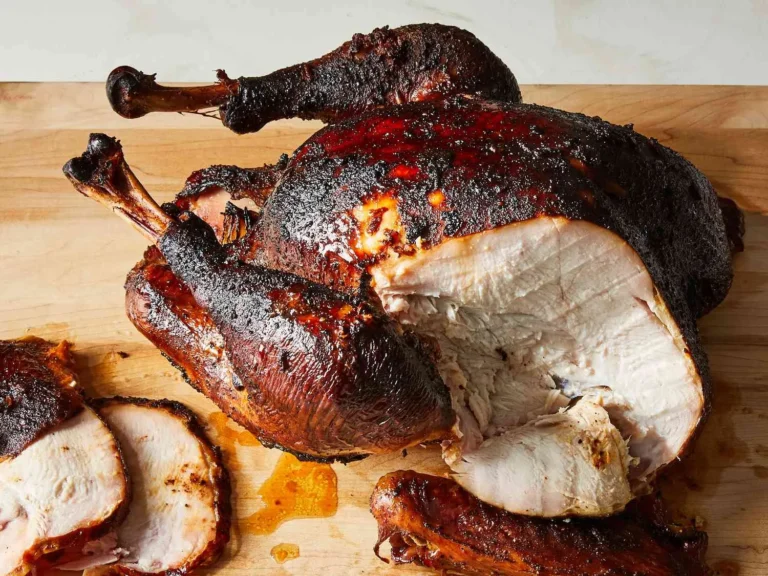How to BBQ Sausage?
Cooking sausages on the grill is one of those culinary pleasures that brings people together. Whether you’re at a backyard cookout, a tailgate party, or just soaking up a sunny weekend, the sizzle and aroma of sausages on the grill are unbeatable. The beauty of grilling sausages lies in their simplicity and versatility. From bratwurst and chorizo to Italian and chicken sausages, each type offers a unique flavor experience.
Wondering how to BBQ sausage the right way? The basics are pretty straightforward, but a few key tips can elevate your grilling game. First, it’s essential to understand that sausages need a bit of gentle heat to cook through without burning the outside.
Using a two-zone fire setup on your grill—one side for direct heat and the other for indirect heat—allows you to control the cooking process more efficiently.
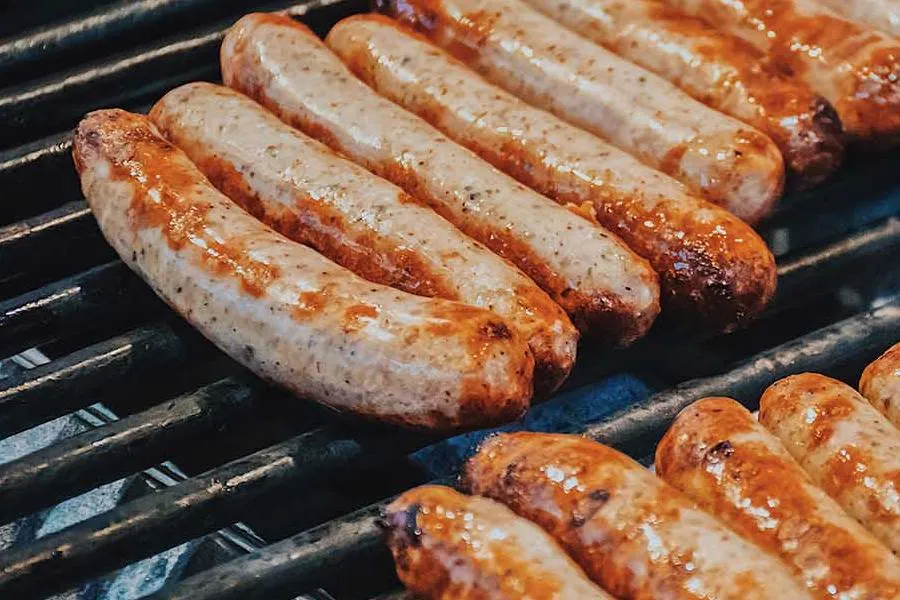
Stick around as we break down the steps to barbecue a sausage, explore different types of sausages, and share some expert tips to enhance your BBQ experience. Ready to become a sausage grilling master? Let’s dive in!
Picking the Ideal Sausage for Grilling
Choosing the right sausage for grilling is where the culinary magic begins. The type of sausage you select can greatly influence the flavor, juiciness, and overall grilling experience. Here are some top choices, along with their flavor profiles and fat content considerations:
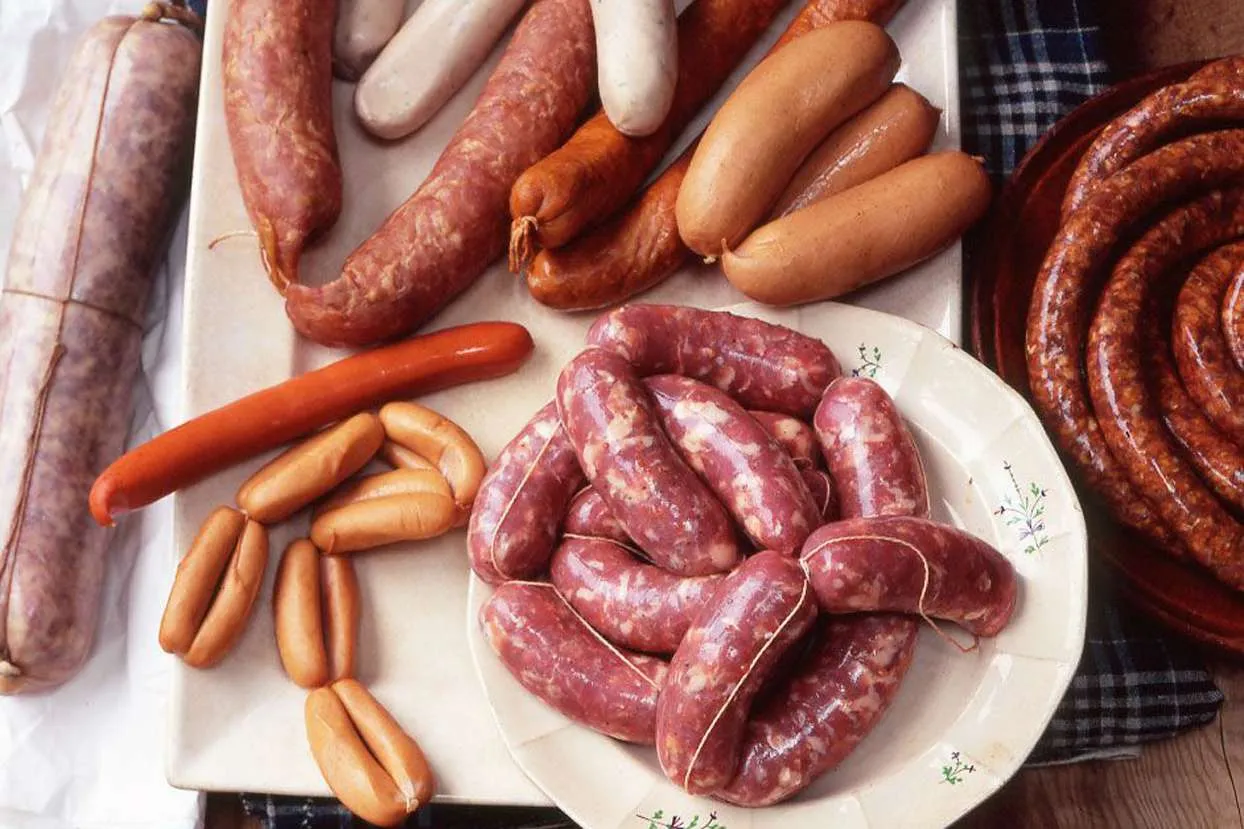
- Bratwurst
- Bratwurst is a quintessential option for grilling. Hailing from Germany, these sausages are usually made from pork, beef, or veal and are seasoned with spices such as nutmeg, ginger, and caraway. Their higher fat content ensures they stay juicy and flavorful when grilled, making them a staple at many BBQs.
- Italian Sausage
- Italian sausages are available in both sweet and spicy varieties, seasoned with fennel, garlic, and herbs. Primarily made from pork, they have a moderate fat content that keeps them moist and tasty on the grill. The spicy version adds a nice kick, perfect for those who enjoy a bit of heat.
- Chorizo
- Chorizo, with its bold and smoky flavor, is another fantastic choice. There are two main types: Spanish chorizo, which is cured and doesn’t need cooking, and Mexican chorizo, which is fresh and must be cooked. The Mexican variety, with its rich blend of spices and higher fat content, is perfect for grilling.
- Chicken Sausage
- For a leaner option, chicken sausages are a fantastic alternative. They come in a variety of flavors, from apple and sage to spicy jalapeño. Although they have less fat than pork sausages, many are infused with additional ingredients to boost moisture and flavor, making them a healthier yet tasty choice for the grill.
- Kielbasa
- Kielbasa, or Polish sausage, is another favorite for grilling. Typically made from pork and beef and seasoned with garlic, marjoram, and other spices, kielbasa boasts a robust flavor and moderate fat content. It grills up nicely, offering a juicy bite with every piece.
- Andouille
- For those who love Cajun flavors, Andouille sausage is a must-try. This smoked sausage is made from pork and seasoned with garlic, pepper, onions, and wine. Its rich, spicy flavor and higher fat content make it perfect for grilling, adding a distinctive taste to any BBQ spread.
When selecting sausages for grilling, it’s essential to balance flavor and fat content. Sausages with a higher fat content tend to remain juicy and flavorful, while leaner varieties can be just as tasty with the right seasoning and grilling technique. Regardless of your choice, ensuring high-quality and fresh ingredients will enhance your grilling experience.
Prepping Sausages for the Grill
Properly preparing your sausages ensures they cook perfectly on the grill. Here’s a quick guide to help you get started.
Pre-Cooking Methods
Pre-cooking sausages can help prevent uneven cooking and flare-ups. Simmer them in water or beer for about 10 minutes before grilling. This ensures they’re cooked through and reduces the risk of burning the outside while leaving the inside undercooked.

Preparing Vegetarian Sausages
BBQ plant-based sausages can be just as delicious with the right preparation. Here’s how to ensure they grill well and taste great.
- Seasoning Tips Vegetarian sausages often benefit from a brief parboil, just like meat sausages. This helps firm them up and prevents them from falling apart on the grill. Boil them for about 5 minutes, then let them cool slightly before grilling.
- Seasoning and Oiling Brush vegetarian sausages with olive oil to prevent sticking and enhance flavor. Since they can be less fatty than meat sausages, this step is crucial. Season them with your favorite herbs and spices, or marinate them briefly in a mixture of olive oil, garlic, and herbs for an extra flavor boost.
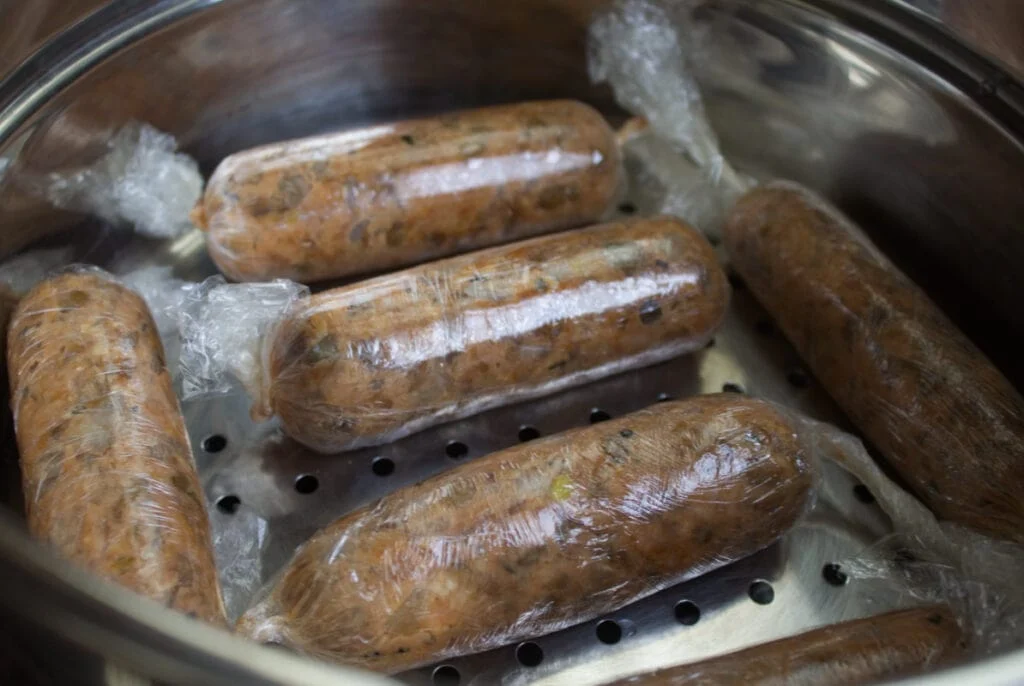
Grilling Techniques
Mastering the art of grilling sausages involves knowing the right techniques to achieve the perfect balance of a crispy exterior and juicy interior. Here’s a detailed guide on how to grill sausages effectively.
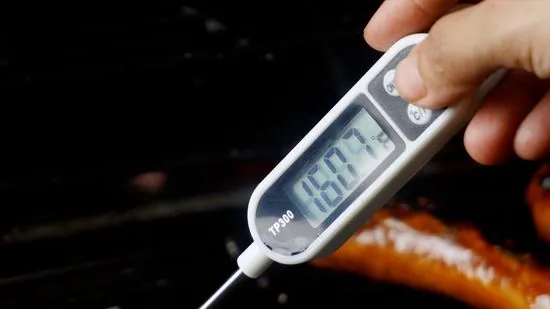

- Direct vs. Indirect Heat Using both direct and indirect heat is crucial. Start by searing the sausages over direct heat to get that beautiful char and grill marks. Then, move them to indirect heat to cook through without burning the outside. This two-zone method ensures even cooking and juicy results.
- Turning and Monitoring Turn sausages frequently to ensure even browning and prevent burning. Use tongs instead of a fork to avoid piercing the sausages and losing juices. Monitor them closely and adjust the heat if needed to maintain consistent cooking.
Grill Temperature and Setup
Different sausages require specific temperatures and grill setups to achieve optimal results.
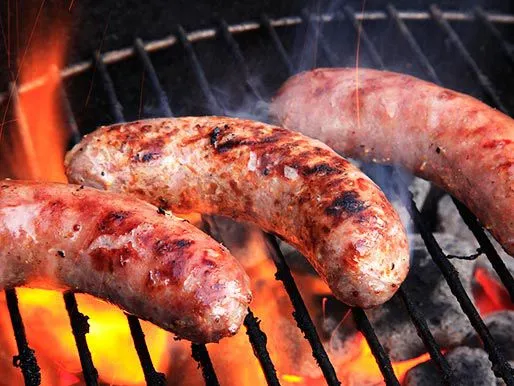
| Type of Sausage | Grill Temperature | Grilling Method |
|---|---|---|
| Bratwursts and Kielbasa | Medium heat (350°F / 175°C) | Two-zone fire: Start with direct heat for a quick sear, then finish on indirect heat. |
| Italian and Chorizo | Slightly higher heat (375°F / 190°C) | Two-zone method: Ensure the direct heat side isn’t too hot to avoid charring. |
| Chicken Sausages | Medium heat (325°F / 160°C) | Use indirect heat for most of the cooking time due to lower fat content. |
| Vegetarian Sausages | Medium heat (350°F / 175°C) | Grill on indirect heat or use a grill basket to prevent sticking and falling apart. |
Grilling Time for Sausages
The time it takes to grill sausages depends on their size and type. Here’s a helpful guide to ensure they’re cooked thoroughly.
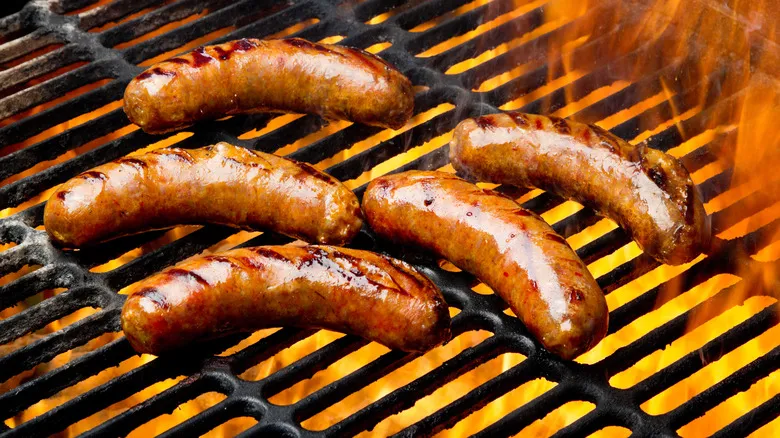
| Type of Sausage | Grilling Time | Grilling Method |
|---|---|---|
| Bratwursts and Kielbasa | 15-20 minutes | Start with 3-4 minutes on direct heat for searing, then move to indirect heat for 10-15 minutes, turning frequently. |
| Italian and Chorizo | 12-15 minutes | Sear for 2-3 minutes per side on direct heat, then finish on indirect heat for another 8-10 minutes. |
| Chicken Sausages | 15-20 minutes | Start with 2-3 minutes on direct heat, then move to indirect heat for 12-15 minutes, ensuring they reach an internal temperature of 165°F (74°C). |
| Vegetarian Sausages | 10-12 minutes | Use indirect heat or a grill basket, turning frequently to avoid sticking and ensure even cooking. |
Knowing When Sausages Are Perfectly Cooked
Ensuring sausages are perfectly cooked is crucial for both flavor and safety. Here’s how to tell when they’re done:
- Visual Cues: Look for a nice golden-brown color with slight charring on the exterior. The sausages should be firm to the touch but not hard. Avoid sausages that are overly blackened or shriveled, as this indicates they may be overcooked.
- Internal Temperature: The most reliable way to check doneness is by using a meat thermometer. Insert the thermometer into the thickest part of the sausage. For pork, beef, or lamb sausages, an internal temperature of 160°F (71°C) is ideal. For chicken sausages, aim for 165°F (74°C). Vegetarian sausages should be hot throughout, usually around 165°F (74°C) as well.
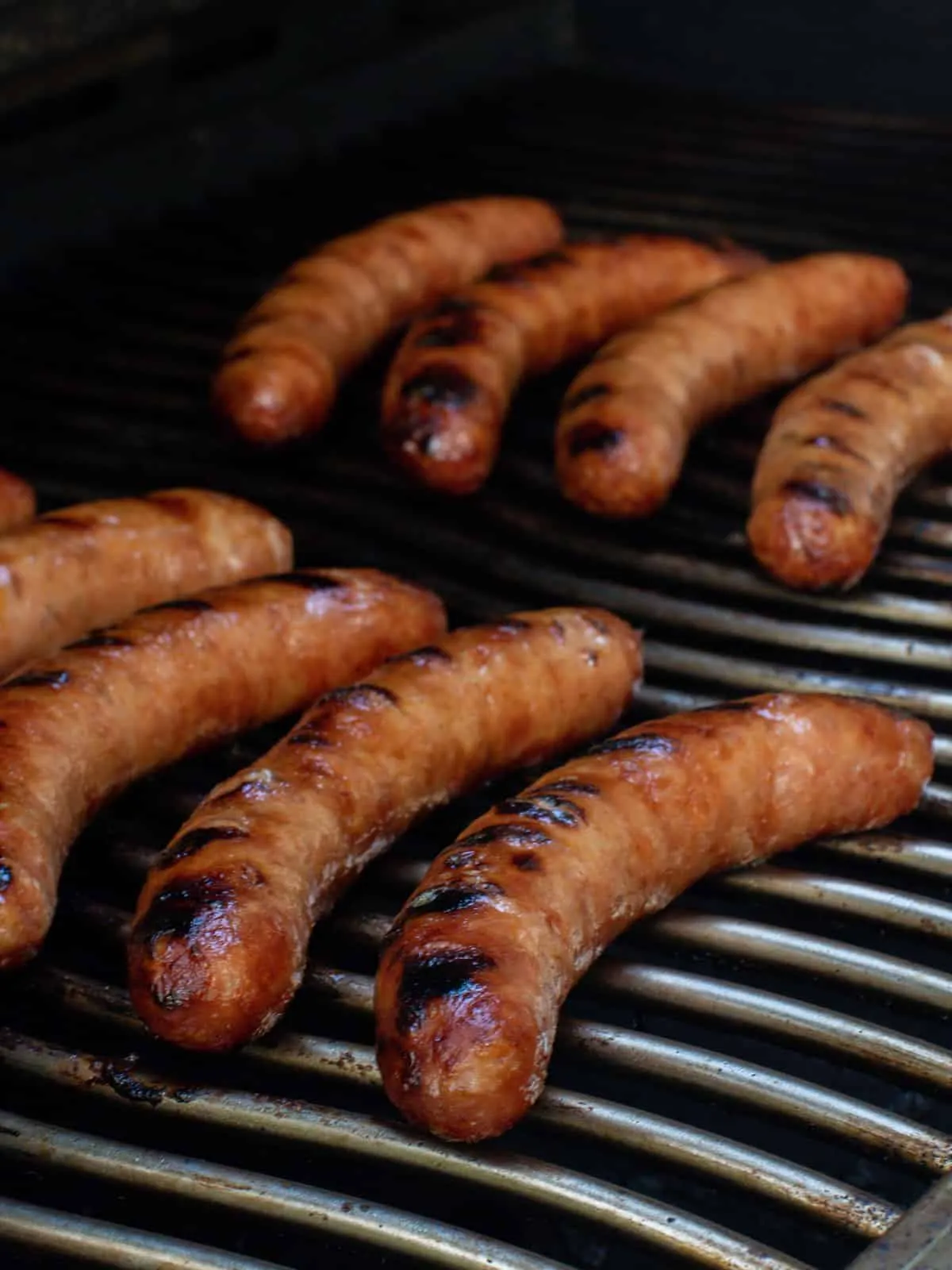
Common Questions and Myths
Grilling sausages often comes with various misconceptions. Let’s clear up a few:
Should You Puncture Sausages?
Pros:
- Preventing Splitting: Some think puncturing sausages prevents them from splitting open during grilling.
- Fat Reduction: It allows excess fat to escape, which can be appealing if you’re aiming for a leaner result.
Cons:
- Loss of Juices: Puncturing sausages causes the flavorful juices to escape, leading to drier, less tasty sausages.
- Reduced Flavor: Much of the seasoning and spices can be lost with the escaping juices, diminishing the overall flavor.
Should You Slice Sausages Before Grilling?
Pros:
- Quicker Cooking: Slicing sausages can reduce cooking time, making them a good option for a quick meal.
- Caramelization: Sliced sausages have more surface area exposed to the grill, leading to more caramelization and crispy edges.
Cons:
- Dryness: Sliced sausages can dry out more quickly as the juices have more opportunity to escape.
- Loss of Structure: Slicing can cause the sausage to lose its shape and fall apart more easily on the grill.
Generally, it’s best to avoid puncturing or slicing sausages before grilling to retain their juices and flavor. Use the two-zone grilling method to prevent splitting and ensure even cooking. If you prefer sliced sausages for specific recipes or quicker meals, keep an eye on them to prevent drying out.
Serving Grilled Sausage
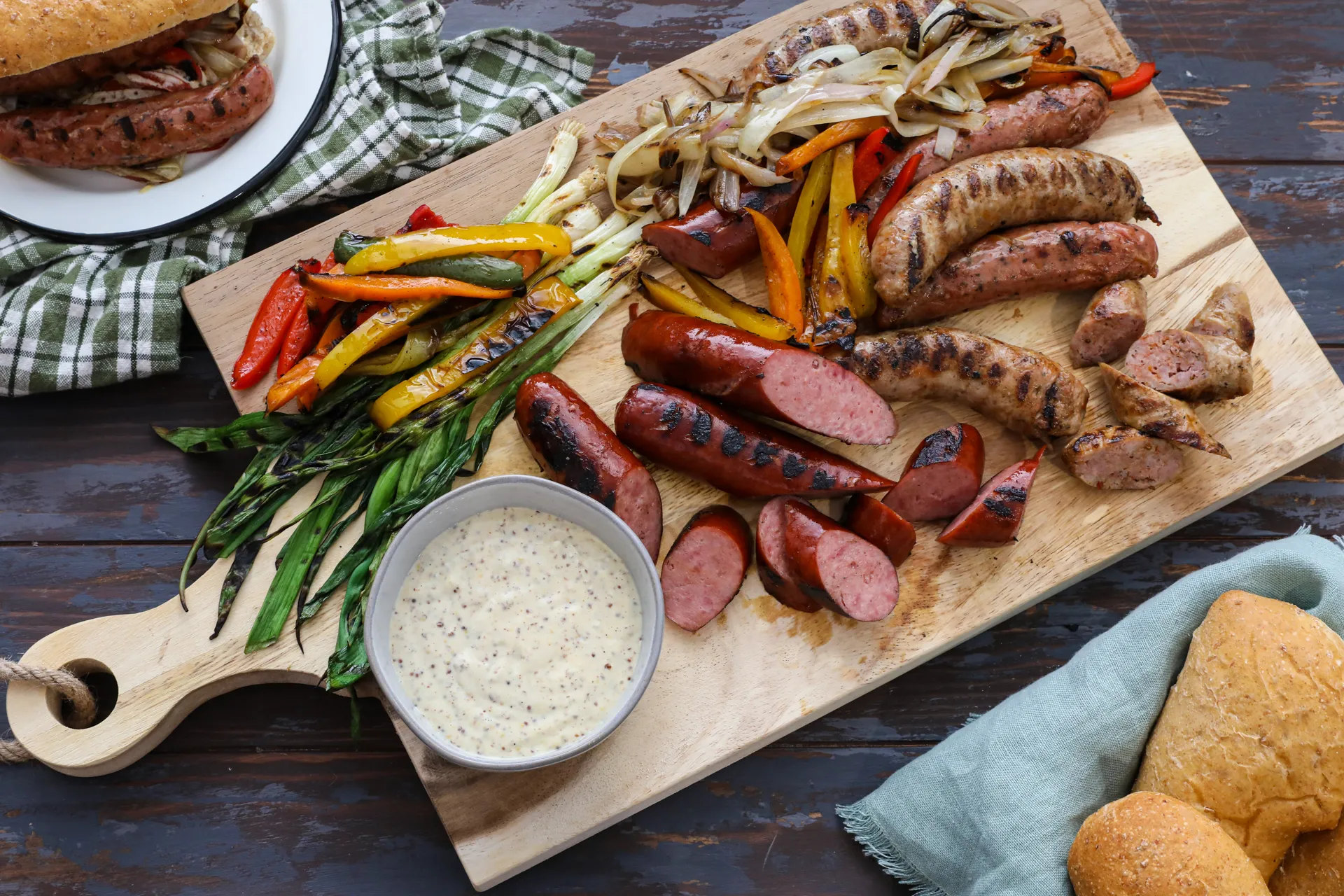
- Grilled Vegetables: Peppers, onions, zucchini, and corn on the cob complement sausages well and add a healthy, colorful touch to your meal.
- Potato Salad: A classic side that pairs perfectly with the smoky flavor of grilled sausages. Try a German potato salad with a tangy vinegar dressing for a unique twist.
- Coleslaw: Creamy or vinegar-based coleslaw adds a refreshing crunch and balances the richness of sausages.
- Baked Beans: Slow-cooked, smoky baked beans are a hearty side that complements the flavors of grilled sausages.
- Crusty Bread or Rolls: Serve sausages in a hearty bun or alongside crusty bread to soak up the juices and condiments.
Condiments
- Mustards: Offer a variety of mustards, from spicy Dijon to sweet honey mustard.
- Sauerkraut: Fermented cabbage adds a tangy crunch that’s perfect with bratwurst and Polish sausages.
- Relishes: Sweet or tangy relishes, such as pickle or onion relish, enhance the flavor of grilled sausages.
- Chutneys and Jams: Fruit chutneys or onion jam can provide a sweet contrast to savory sausages.
- Grilled Onions and Peppers: Add these as toppings for a delicious and colorful addition to your sausage sandwich.
Featured Recipes
Grilling sausages can be an enjoyable culinary adventure. Here are a few selected recipes to help you grill different types of sausages, from Italian to Bratwurst to Polish.
Grilled Italian Sausage Recipe
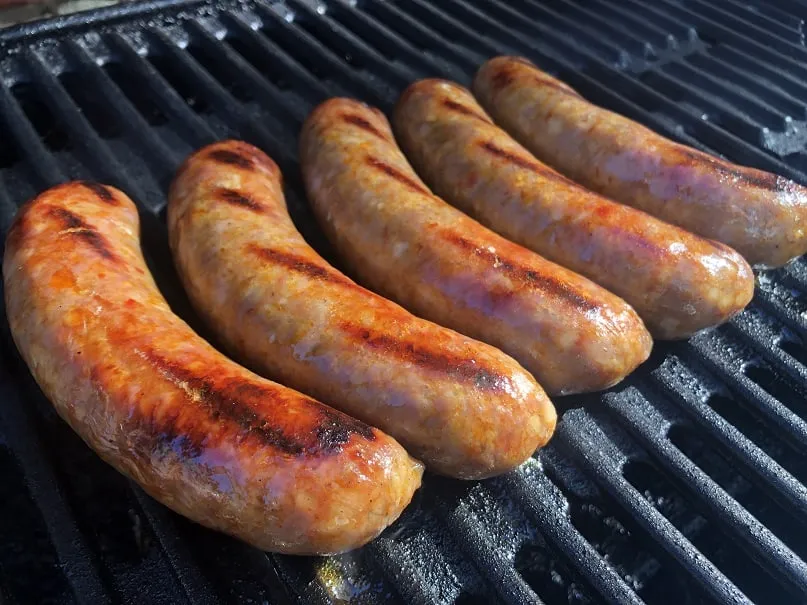
Ingredients:
- Italian sausages (sweet or hot)
- Olive oil
- Bell peppers and onions, sliced
- Fresh basil
- Provolone cheese
- Hoagie rolls
Instructions:
- Preheat the Grill: Set up a two-zone fire with direct and indirect heat.
- Prepare the Sausages: Lightly brush the sausages with olive oil.
- Grill: Place the sausages on direct heat. Sear for 2-3 minutes per side until nicely browned.
- Move to Indirect Heat: Transfer the sausages to indirect heat. Cook for another 10-15 minutes, turning occasionally.
- Cook the Peppers and Onions: Grill bell peppers and onions until tender and slightly charred.
- Assemble: Place sausages in hoagie rolls, top with grilled peppers, onions, fresh basil, and provolone cheese.
- Serve: Serve with a side of potato salad or coleslaw for a complete meal.
How to Grill Bratwurst
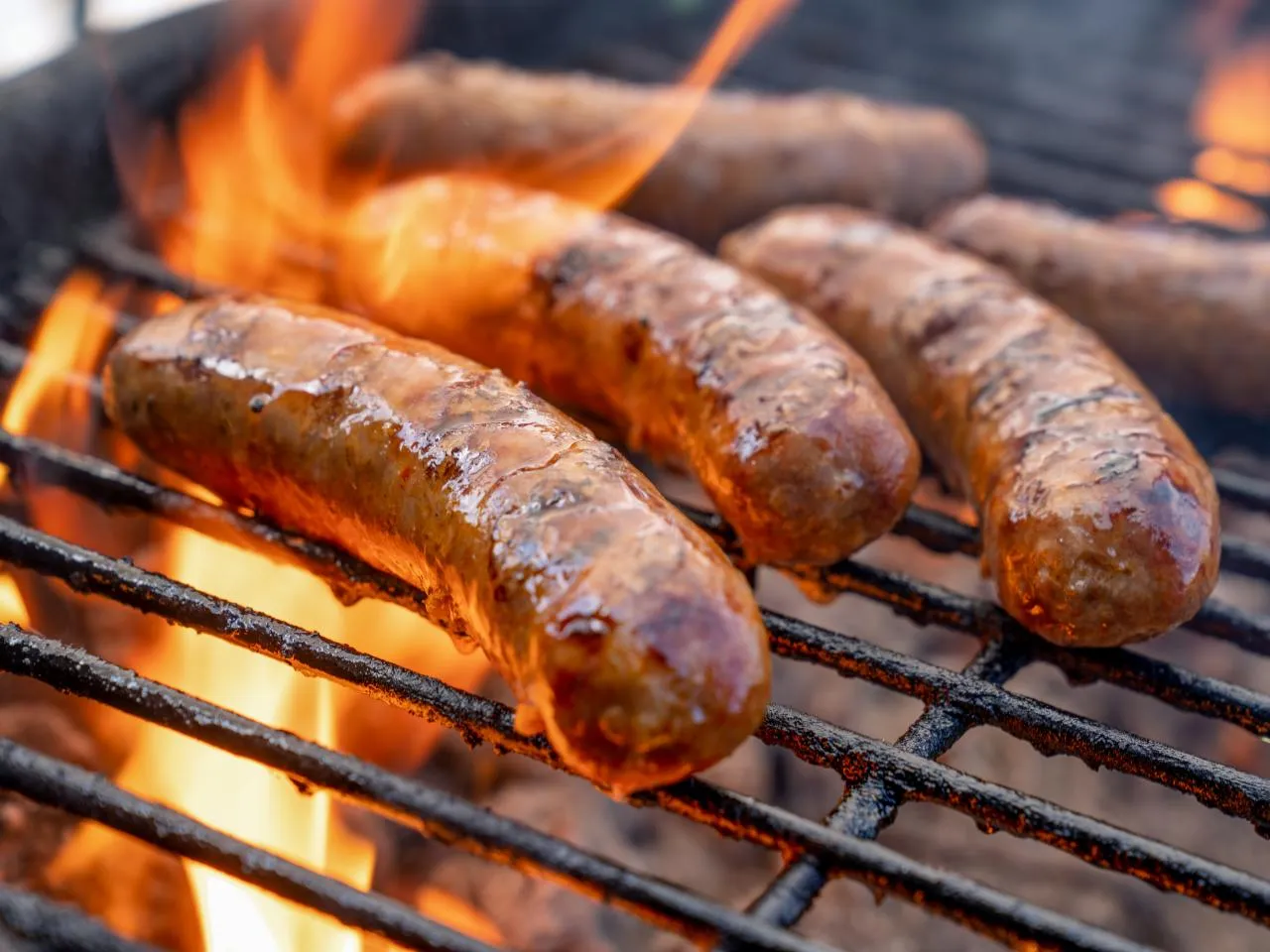
Ingredients:
- Bratwursts
- Beer or water for pre-cooking
- Sauerkraut
- Mustard (variety of choices)
- Hot dog buns
Instructions:
- Preheat the Grill: Create a two-zone fire with direct and indirect heat.
- Simmer the Bratwursts: In a pot, simmer bratwursts in beer or water for about 10 minutes to pre-cook.
- Grill on Direct Heat: Place bratwursts on the direct heat side of the grill. Sear for 2-3 minutes per side until they have nice grill marks.
- Move to Indirect Heat: Transfer to indirect heat. Cook for an additional 10-15 minutes, turning occasionally, until internal temperature reaches 160°F (71°C).
- Serve: Place bratwursts in hot dog buns, top with sauerkraut and mustard. Pair with grilled corn on the cob and a cold beer for a traditional BBQ experience.
Grilled Polish Sausage Recipe
Ingredients:
- Polish sausages (Kielbasa)
- Garlic cloves, minced
- Olive oil
- Fresh herbs (rosemary, thyme)
- Rye bread
- Pickles
Instructions:
- Preheat the Grill: Set up a two-zone fire.
- Prepare the Sausages: Brush sausages with olive oil and sprinkle with minced garlic and fresh herbs.
- Grill: Place sausages on direct heat. Sear for 2-3 minutes per side until nicely browned.
- Move to Indirect Heat: Transfer to indirect heat. Cook for another 10-15 minutes, turning occasionally.
- Serve: Slice sausages and serve with rye bread and pickles. Enjoy with a side of grilled vegetables for a hearty meal.
Nutritional Information
The nutritional content of grilled sausages can vary based on the type of sausage and preparation method. Here’s a general breakdown for a typical serving size (one sausage, approximately 3.5 ounces or 100 grams) of various popular types of grilled sausages:
| Nutrient | Italian Sausage | Bratwurst Sausage | Chicken Sausage | Vegetarian Sausage |
|---|---|---|---|---|
| Calories | 270 | 300 | 150 | 180 |
| Total Fat | 22g | 25g | 10g | 9g |
| Saturated Fat | 8g | 9g | 3g | 1g |
| Trans Fat | 0g | 0g | 0g | 0g |
| Cholesterol | 70mg | 75mg | 60mg | 0mg |
| Sodium | 800mg | 750mg | 550mg | 600mg |
| Total Carbohydrates | 2g | 2g | 1g | 6g |
| Dietary Fiber | 0g | 0g | 0g | 2g |
| Sugars | 1g | 1g | 0g | 1g |
| Protein | 14g | 13g | 14g | 15g |
Health Considerations
- Fat Content: Traditional pork sausages like Italian and bratwurst have higher fat content, especially saturated fat, which should be consumed in moderation to maintain heart health. Opting for chicken or vegetarian sausages can lower fat intake.
- Sodium Levels: Sausages tend to be high in sodium, which can contribute to hypertension if consumed excessively. It’s important to balance sausage intake with low-sodium foods throughout the day.
- Protein: Sausages are a good source of protein, essential for muscle repair and overall health. Including a variety of protein sources in your diet ensures a balanced intake of amino acids.
- Portion Control: Given the calorie density of sausages, portion control is key. Pairing sausages with vegetables and whole grains can create a more balanced meal.
- Ingredients and Additives: Check the ingredients list for added preservatives or artificial ingredients. Opting for sausages with natural ingredients can be a healthier choice.
Disclosure: Our blog contains affiliate links to products. We may receive a commission for purchases made through these links. However, this does not impact our reviews and comparisons. We try our best to keep things fair and balanced, in order to help you make the best choice for you.

